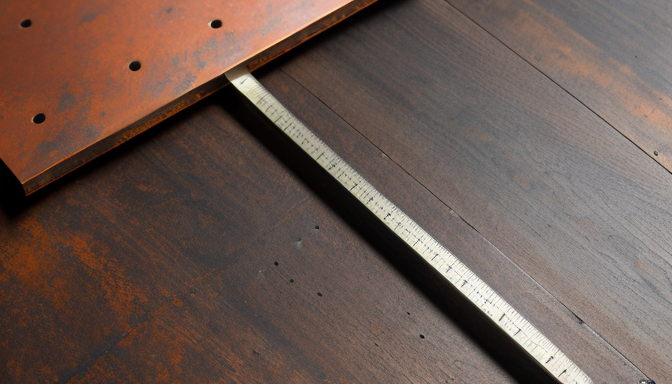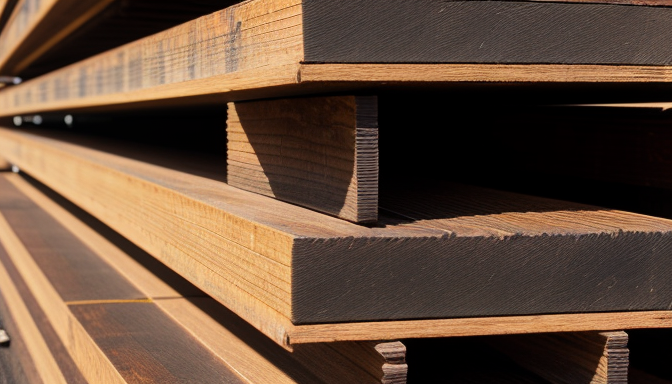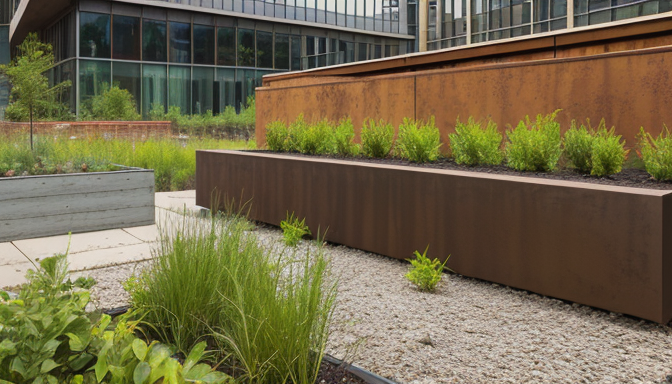, often called weathering steel, is a fascinating material that has captured the attention of architects, builders, and artists alike. Its unique ability to develop a rust-like appearance gives it a distinctive look that blends beautifully with nature. Imagine walking through a park and seeing a sculpture that looks like it’s been part of the landscape for ages. That’s the magic of corten steel!
But what sets corten steel apart from regular steel? It’s all about its composition. Corten steel contains copper, phosphorus, nickel, and chromium, which work together to create a protective layer of rust. This layer not only adds to its aesthetic appeal but also protects the steel from further corrosion. So, it’s like a shield that gets better with age!
When it comes to construction, corten steel is a top choice for various applications. You’ll find it in everything from bridges and buildings to outdoor sculptures and furniture. Why? Because it’s not just about looks. Corten steel is incredibly durable and can withstand harsh weather conditions. It’s like that friend who’s always there for you, no matter the storm!
Whether you’re considering corten steel for a project or just curious about its properties, it’s essential to understand its price, weight, and sizes. These factors can influence your decision and budget. For instance, the price can fluctuate based on market demand and thickness. A thicker sheet might cost more, but it could also offer more strength for your project.
In summary, corten steel is more than just a material; it’s a statement. Its ability to age gracefully and its strength make it a favorite among many. If you’re thinking about using corten steel, you’re not just choosing a product; you’re choosing a piece of art that tells a story over time.
Corten Steel Price
Understanding the price of corten steel is essential for budgeting in construction projects. It’s not just about picking a material; it’s about making smart financial choices. The cost of corten steel can fluctuate based on several factors. For instance, market demand plays a significant role. When demand is high, prices tend to rise. Think of it like a popular concert ticket—when everyone wants to go, the price goes up.
Another crucial factor is the thickness of the corten steel. Thicker sheets naturally cost more than their thinner counterparts. It’s like buying a thick steak versus a thin slice of ham; the more meat, the more you pay. Additionally, the supplier’s pricing strategies can greatly impact the final cost. Different suppliers may have various pricing models based on their own expenses and profit margins.
To give you a clearer picture, here’s a simple table that outlines some typical prices based on thickness:
| Thickness (inches) | Price per square foot |
|---|---|
| 0.25 | $5.00 |
| 0.50 | $7.50 |
| 0.75 | $10.00 |
| 1.00 | $12.50 |
When planning your project, it’s wise to get multiple quotes from different suppliers. This way, you can compare prices and find the best deal. Don’t forget to ask about shipping costs too! Sometimes, a cheaper price can be offset by high delivery fees. In the end, being informed about the pricing of corten steel can save you money and help you make the right choices for your project.
In conclusion, while the price of corten steel is influenced by various factors, understanding these elements can help you navigate the purchasing process with ease. So, next time you’re budgeting for a construction project, keep these tips in mind. Knowledge is power, and it can lead to better financial decisions!

Corten Steel Weight
The weight of corten steel is an important factor that many people overlook. It’s not just about how it looks; it’s also about how it performs in various applications. When you’re planning a construction project, knowing the weight of the materials is crucial. Why? Because it impacts everything from structural integrity to transportation logistics.
Corten steel comes in different thicknesses and dimensions, which means its weight can vary significantly. For instance, a 1/4 inch thick sheet will weigh less than a 1 inch thick sheet. This difference can affect how you handle the material on-site. If you don’t account for the weight, you might find yourself in a tricky situation when it comes to lifting and moving the steel.
To give you a clearer picture, let’s look at a simple table comparing the weights of different thicknesses of corten steel:
| Thickness (inches) | Weight (lbs per square foot) |
|---|---|
| 1/8 | 0.79 |
| 1/4 | 1.58 |
| 1/2 | 3.17 |
| 3/4 | 4.76 |
| 1 | 6.35 |
As you can see, the weight increases as the thickness does. This means if you’re using corten steel for a large project, you’ll need to plan for the weight accordingly. Have you ever tried to lift something that was too heavy? It can be a real hassle. That’s why knowing the weight helps you prepare and avoid any surprises.
Moreover, the weight of corten steel can also affect transportation costs. Heavier materials might require special vehicles or more trips to the site. This can add up quickly. So, it’s not just about picking the right thickness for your project; it’s also about understanding how that choice impacts your budget.
In conclusion, the weight of corten steel is a vital consideration in any construction or artistic project. It influences how you handle the material, the costs involved, and ultimately, the success of your project. So, the next time you’re planning with corten steel, remember: weight matters!
Corten Steel Properties
Corten steel is not just any steel; it has a personality all its own. Known for its distinctive, rusty appearance, this material is engineered to withstand the elements. It develops a protective layer of rust that actually prevents further corrosion. Imagine wearing a jacket that gets better with age—this is corten steel in the world of materials!
One of the standout features of corten steel is its corrosion resistance. Unlike regular steel, which can rust and degrade quickly when exposed to moisture, corten steel forms a stable oxide layer. This layer acts like a shield, protecting the inner steel from further damage. It’s like having an armor that keeps the core safe. This property makes corten steel ideal for outdoor structures, sculptures, and architectural elements.
Another impressive property is its strength. Corten steel is incredibly strong and can bear heavy loads, making it a favorite among architects and builders. It’s not just about looks; it’s about durability and reliability. When you choose corten steel, you’re choosing a material that can stand the test of time.
But wait, there’s more! Corten steel is also versatile. It can be cut, welded, and shaped into various forms. This flexibility allows artists and designers to create stunning works that blend seamlessly with their surroundings. Whether it’s a modern sculpture in a park or a striking facade on a building, corten steel does it all.
Here’s a quick rundown of some of the key properties of corten steel:
| Property | Description |
|---|---|
| Corrosion Resistance | Forms a protective layer to prevent further rusting. |
| Strength | High tensile strength suitable for heavy loads. |
| Versatility | Easily shaped for various artistic and architectural applications. |
| Aesthetic Appeal | Develops a unique, weathered look that enhances visual interest. |
In summary, corten steel is a powerhouse of properties that make it a preferred choice for many projects. Its corrosion resistance, strength, and versatility are just a few reasons why it’s so popular. So, if you’re considering a project that requires a material that looks great and lasts long, corten steel might just be your best bet!

Corten Steel Sizes
Corten steel, known for its striking appearance and exceptional durability, comes in a variety of sizes and thicknesses. This variety is crucial for meeting the specific needs of different projects, whether they are architectural masterpieces or functional structures. Imagine choosing a canvas for a painting; the size and shape influence the final artwork. Similarly, the dimensions of corten steel can greatly affect the outcome of your project.
When selecting corten steel, it’s important to consider what you need it for. Are you building a fence, creating a sculpture, or constructing a large commercial building? Each application has its own requirements. For instance, a sculpture may need thinner sheets to achieve intricate designs, while a building might require thicker plates for structural integrity.
Here’s a quick overview of common sizes and thicknesses available:
| Thickness (mm) | Common Uses |
|---|---|
| 3 | Art installations, decorative elements |
| 5 | Lightweight structures, signage |
| 8 | Residential fencing, garden features |
| 10 | Commercial buildings, bridges |
| 12+ | Heavy-duty applications, industrial use |
Understanding these sizes helps you make informed decisions. You wouldn’t want to use a thin sheet for a load-bearing wall, right? That could lead to serious issues down the line. On the flip side, using overly thick plates for a decorative feature can be unnecessarily heavy and expensive.
Moreover, corten steel is often available in standard sheet sizes, typically around 1.2m x 2.4m. However, many suppliers offer custom sizes to fit unique project requirements. This flexibility allows for creative designs and efficient use of materials, reducing waste and cost.
Additionally, when ordering corten steel, it’s wise to consult with suppliers about the best sizes for your specific needs. They can provide guidance based on their experience and knowledge of the material. It’s like having a seasoned chef help you choose the right ingredients for a dish; their expertise can elevate your project.
In summary, choosing the right size of corten steel is essential. It impacts not only the aesthetic appeal but also the functionality and safety of your project. Take the time to understand your options, and you’ll be well on your way to creating something truly remarkable.
Frequently Asked Questions
- What is Corten steel?
Corten steel, also known as weathering steel, is a type of steel that develops a rust-like appearance when exposed to weather. This unique patina not only gives it an attractive look but also protects the steel from further corrosion, making it a great choice for outdoor applications.
- How much does Corten steel cost?
The price of Corten steel can vary widely depending on several factors including thickness, size, and market demand. On average, you might expect to pay more for Corten steel compared to standard steel due to its special properties and durability.
- What are the properties of Corten steel?
Corten steel is celebrated for its exceptional strength, corrosion resistance, and aesthetic appeal. It can withstand harsh weather conditions, making it ideal for outdoor sculptures, buildings, and landscaping. Its ability to form a protective layer of rust is what sets it apart from other materials.
- What sizes does Corten steel come in?
Corten steel is available in a variety of sizes and thicknesses, catering to different project needs. Whether you need thin sheets for artistic applications or thicker plates for structural purposes, there’s likely a suitable option available.
- Is Corten steel suitable for all climates?
While Corten steel is designed to withstand various weather conditions, it’s best suited for environments that allow it to develop its protective patina. In extremely humid or wet climates, the rusting process may be accelerated, which could lead to more maintenance.
- Can Corten steel be welded?
Yes, Corten steel can be welded, but it requires specific techniques and considerations to maintain its properties. It’s advisable to consult with a professional welder who has experience working with this type of steel to ensure the best results.
